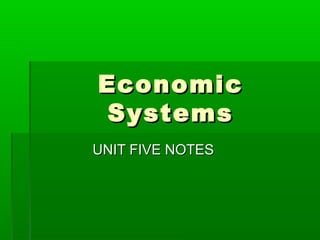
Economic systems
- 1. EconomicEconomic SystemsSystems UNIT FIVE NOTESUNIT FIVE NOTES
- 2. Economic SystemsEconomic Systems When deciding how to use its limitedWhen deciding how to use its limited resources, every country answers 3 questionsresources, every country answers 3 questions about production and distributionabout production and distribution What will be produced?What will be produced? How will it be produced?How will it be produced? For whom will it be produced?For whom will it be produced? How a country answers these questionsHow a country answers these questions depends on the type of economic system theydepends on the type of economic system they havehave
- 3. Four Types ofFour Types of Economic Systems:Economic Systems: 1. Traditional Economy1. Traditional Economy 2. Command Economy2. Command Economy 3. Market Economy3. Market Economy 4. Mixed Economy4. Mixed Economy
- 4. Traditional EconomyTraditional Economy An economic system in which productionAn economic system in which production and distribution questions are answeredand distribution questions are answered by looking to the pastby looking to the past People will make what they always made;People will make what they always made; will do the same work their parents didwill do the same work their parents did Economic decisions are made by customsEconomic decisions are made by customs and beliefsand beliefs Example: Inuit; some parts of Africa andExample: Inuit; some parts of Africa and South AmericaSouth America
- 5. Command SystemCommand System An economic system in which production andAn economic system in which production and distribution questions are answered by centraldistribution questions are answered by central planners (government)planners (government) Example: North Korea, former Soviet Union, Cuba,Example: North Korea, former Soviet Union, Cuba, *most Communist countries*most Communist countries --Germany and Russia have moved away from--Germany and Russia have moved away from having a Command economy since 1991. Now theyhaving a Command economy since 1991. Now they have a Mixed economy.have a Mixed economy. Economic decisions are made by the governmentEconomic decisions are made by the government
- 6. Command SystemCommand System (Cont.)(Cont.) Planners estimate what goods will be neededPlanners estimate what goods will be needed in the future and work backward to decidein the future and work backward to decide what materials and workers are needed nowwhat materials and workers are needed now Planners can be wrong about future needs,Planners can be wrong about future needs, and they do not provide people with manyand they do not provide people with many choiceschoices Example: Farming--the government decidedExample: Farming--the government decided who would be farmers, what they would grow,who would be farmers, what they would grow, and how much would be turned over to theand how much would be turned over to the governmentgovernment
- 7. Market EconomyMarket Economy An economic system in which productionAn economic system in which production and distribution questions are answeredand distribution questions are answered by prices and profitsby prices and profits Economic decisions are based onEconomic decisions are based on FreeFree EnterpriseEnterprise Most Democratic countries have aMost Democratic countries have a variation of a Market economy & avariation of a Market economy & a Command economy (Mixed economy)Command economy (Mixed economy) There are no truly pure MarketThere are no truly pure Market economies, but the US and the Unitedeconomies, but the US and the United Kingdom are closeKingdom are close
- 8. Market EconomyMarket Economy (Cont.)(Cont.) Businesses will make these products andBusinesses will make these products and provide those services to earn a profitprovide those services to earn a profit Services—in economics, work done forServices—in economics, work done for others; hotels, restaurants, and doctors allothers; hotels, restaurants, and doctors all provide servicesprovide services Businesses will make things using whateverBusinesses will make things using whatever materials, labor, and technology earn thematerials, labor, and technology earn the highest profithighest profit Standard of living is higher under a marketStandard of living is higher under a market system than the others as it often has rapidsystem than the others as it often has rapid technological changetechnological change
- 9. Market EconomyMarket Economy (Cont.)(Cont.) The price of a good depends on how much ofThe price of a good depends on how much of the good is available and how many peoplethe good is available and how many people want itwant it Producers turn resources into goods andProducers turn resources into goods and servicesservices Resources are raw materials, such as oil,Resources are raw materials, such as oil, people’s labor, machinery, and mineralspeople’s labor, machinery, and minerals Governments can also be producers when theyGovernments can also be producers when they provide goods such as roads and schools, orprovide goods such as roads and schools, or when they provide services such as militarywhen they provide services such as military production or health careproduction or health care
- 10. Market EconomyMarket Economy (Cont.)(Cont.) Consumers, or buyers, purchase goods andConsumers, or buyers, purchase goods and servicesservices Consumer—a buyer and user of goods and servicesConsumer—a buyer and user of goods and services Producers and consumers come together toProducers and consumers come together to exchange goods and servicesexchange goods and services Exchange is giving up one thing in return forExchange is giving up one thing in return for anotheranother In a traditional economy, exchange is most likely toIn a traditional economy, exchange is most likely to be in the form of barterbe in the form of barter
- 11. Mixed EconomyMixed Economy Individuals own most resources andIndividuals own most resources and determine what and how to producedetermine what and how to produce Government regulates certain industriesGovernment regulates certain industries Example: China; most nationsExample: China; most nations Market + Command = MixedMarket + Command = Mixed